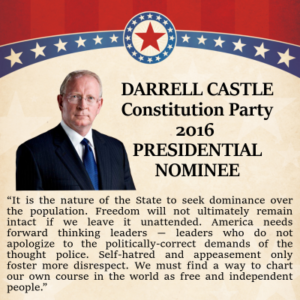With respect to my stated conviction that I will not be voting for either Hillary Clinton or Donald Trump, I’m repeatedly asked about options. They are few, and yes, I understand that no one on a third-party ticket is going to win the presidency. Yet it’s worth looking briefly at what some consider to be third-party options—a place to go without violating one’s conscience.
 Most of the third-party attention is focused on the Libertarian Party and its nominee, former New Mexico governor Gary Johnson.
Most of the third-party attention is focused on the Libertarian Party and its nominee, former New Mexico governor Gary Johnson.
Johnson was the Libertarian nominee in 2012 and earned only about 1% of the vote nationally. Some are saying that could change this year due to the overwhelmingly bad poll numbers for Clinton and Trump. Polls that show which one is leading the other must be understood in the context that, for many, that choice is between two equally disliked candidates.
I once flirted with libertarian ideology, mainly because I was drawn to its commitment to the free market and limited government. I attended a libertarian conference two decades ago that gave me greater insight into the ideology. I saw that, even though I could agree with libertarians on economic issues, there were other serious deficiencies in their thought.
Most of the libertarians I have met and have read about since then are so adamantly devoted to their definition of liberty that it is more like licentiousness. On what are normally called the social issues—abortion, sexuality, marriage—most libertarians believe you should just let people do whatever they want. It’s fine with them to allow abortion as a “freedom,” to be openly homosexual, and to endorse same-sex marriage.
Johnson fits into that category of libertarians. He is opposed to abortion restrictions and announced that he will stop smoking pot while running for president. Really.
Johnson is on record as saying Christian bakers should be forced to bake cakes for same-sex weddings. In an interview on Fox Business Network, he even stated that Jewish bakers should be forced by the government to bake cakes for Nazis.
This is libertarian? It’s certainly not limited government on that issue.
Overall, I think libertarianism is in conflict with basic tenets of the Christian faith and the Libertarian Party is not one that should receive support from Christians. I’m as opposed to it and to its nominee, Johnson, as I am to Clinton and Trump.
 Another option might be the Constitution Party. It used to be called the National Taxpayers Party. I recall meeting with an official of that party in the 1990s and telling him that the name was too narrow, that it seemed to indicate an interest only in economic matters, while the party itself stood for the Constitution. I encouraged him to push for a name change. I suggested Constitution Party.
Another option might be the Constitution Party. It used to be called the National Taxpayers Party. I recall meeting with an official of that party in the 1990s and telling him that the name was too narrow, that it seemed to indicate an interest only in economic matters, while the party itself stood for the Constitution. I encouraged him to push for a name change. I suggested Constitution Party.
Well, a few years later, that’s exactly what it became. Did I do that?
I’ve always been interested in this party and have hoped, over the years, that it might develop more. If you peruse the party platform, you find that it is staunchly pro-life and devoted to the original intent and meaning of the Constitution. The only part of the platform with which I’m not fully in tune is its more isolationist foreign policy that seems to discount even support for Israel.
However, I’m willing to live with the party’s foreign policy because of its overall perspective on government. It doesn’t say we cannot go to war; it simply seeks to follow the Constitution’s precise language that a declaration of war by Congress must come first.
Its nominee, Darrell Castle, is a lawyer and a former Marine who served in Vietnam. Interestingly, he trained under an officer by the name of Oliver North. He has been married to the same woman for 38 years. He and his wife founded a Christian mission to homeless gypsy children in Romania.
The problem with the Constitution Party is that it has never seemed to be able to garner enough support to be on the ballot in all states. I also have been looking to see if it will begin fielding candidates for Congress and state-level offices. Unless I’ve missed something, that isn’t happening. If it were to do so, could it be a possible successor to a Republican party that seems to have lost its way?
If the Constitution Party is on the ballot in Florida, I may very well vote for Castle. If it is not, then what will I do?
I’m not sure if the Florida ballot allows write-ins, but if it does, I will consider that. If neither write-ins nor the Constitution Party are options, I will simply have to decline to vote for anyone for president.
That doesn’t mean I won’t be voting. I will gladly vote for Marco Rubio as senator and for Dennis Ross, my current congressman and a man of integrity.
There is still talk of the rise of a protest party among conservatives. We’ll just have to see if anything comes of that. But whatever transpires, I have to follow my conscience before God.
If Donald Trump wins, the Republican Party may never be what it was, and I may have to cut ties if it becomes even more Democrat-light. If Donald Trump loses, there may be hope that the party has learned a valuable lesson and will regroup with a firmer commitment to its purported principles.
Christians just need to keep praying that God isn’t finished with this nation yet.
